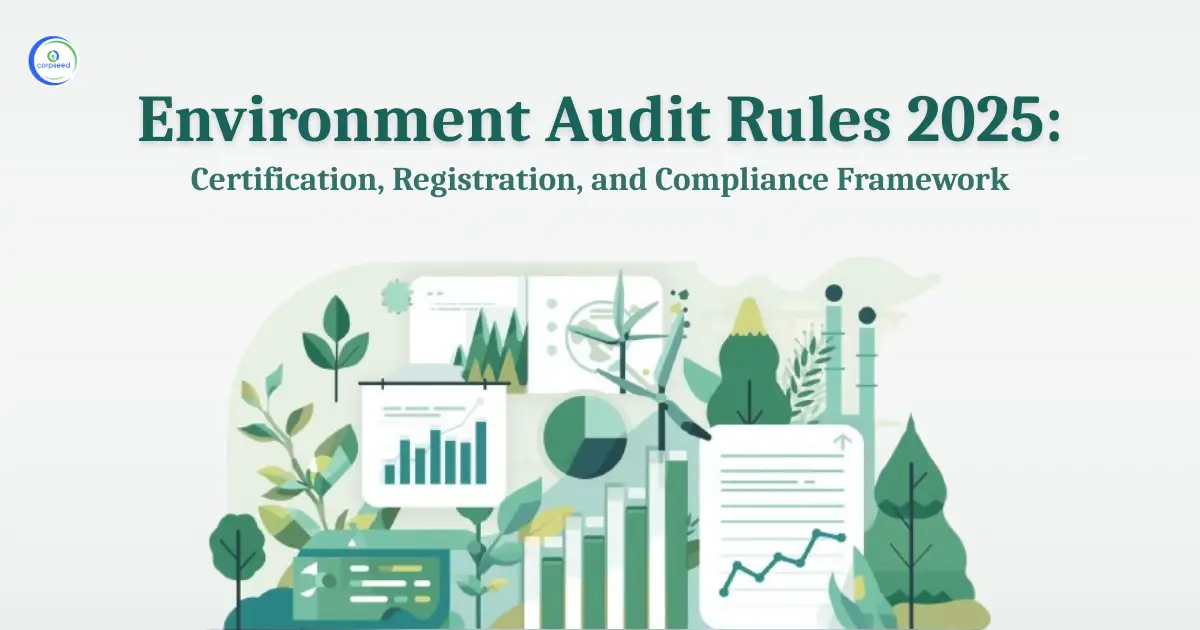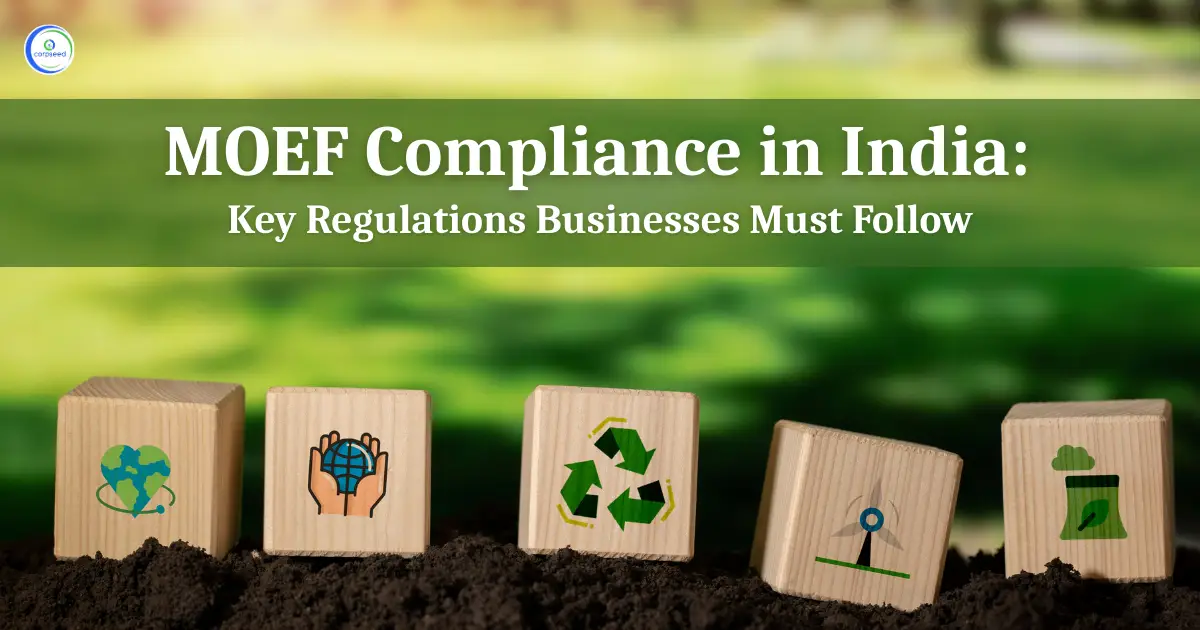The Government of India has notified the Environment Audit Rules 2025 to reinforce environmental governance. These rules build a system for certifying and registering auditors who will perform independent audits of industries and projects. Aimed at strict compliance, ESG alignment, and Green Credit initiatives, these reforms complements laws like the Van (Sanarkshan Ayam Samvardhan) Adhiniyam to foster sustainable development.
Table of Contents
- What Are the Environment Audit Rules 2025?
- Why Are Environment Audits Important?
- Key Features of the Environment Audit Rules 2025
- Benefits of the Environment Audit Rules 2025
- Who Will Be Impacted by These Rules?
- How Will the Certification Process Work?
- How Will Projects Be Assigned to Auditors?
- The Bigger Picture: Linking Audits to Climate Action and Green Growth
- Conclusion
What Are the Environment Audit Rules 2025?
The Environment Audit Rules, 2025 were notified under the Environment (Protection) Act, 1986. These rules specify how environmental audits will be conducted by certified professionals, known as Registered Environment Auditors.
They aim to make environmental monitoring more effective, ensure industries follow safeguards, hold non-compliant entities responsible, and support India's climate and sustainability goals through independent authentication.
Why Are Environment Audits Important?
Environmental audits play a vital role in strengthening compliance and guarding natural resources. They ensure that projects comply with environmental standards and prevent pollution at its source.
Regular audits also motivate companies to self-regulate, establish internal controls, and take accountability for their actions. In addition to compliance, they offer valuable insights for sustainable development, climate policies, and global commitments.
Most significantly, audits are now linked to ESG ratings, Green Credit markets, carbon trading, and green finance instruments like bonds, making them central to India's economic and environmental strategies.
--------------Blog Contact Form-------------
Key Features of the Environment Audit Rules 2025
The Environment Audit Rules, 2025 bring significant modifications that transform environmental monitoring in India. Following are the key features:
- Certification of Environment Auditors: Individuals must qualify either through Recognition of Prior Learning (RPL) for skilled professionals or the National Certification Examination (NCE) for new candidates. Once certified, they can register with the Environmental Audit Designated Agency (EADA) for five years, with the option to renew.
- Registration of Auditors: Certification alone is not enough, auditors and audit firms must be registered with EADA. This ensures a regulated group of qualified professionals accountable for environmental verification across all projects.
- Roles of Registered Environment Auditors: Registered Environment Auditors will:
- Conduct audits of industries, projects, and processes.
- Check compliance under approvals such as Environmental Clearances (EC), Consents, and Authorizations.
- Verify emissions, effluents, and waste management systems.
- Report violations and compute environmental compensation.
- Assist in frameworks like the Green Credit Rules, 2023, Eco-mark, E-Waste, Plastic Waste, and Battery Waste rules.
- Act as independent verifiers for government and global green initiatives.
- Conflict of Interest Safeguards: Auditors cannot audit projects where they have a financial or personal interest. They are also restricted from auditing projects for which they have prepared an Environmental Impact Assessment (EIA). These protects and ensure fairness and impartiality.
- Authority for Site Visits: Registered auditors will have the power to examine sites, gather samples and review records to ensure accurate compliance testing.
- Oversight by Environment Audit Designated Agency (EADA): The EADA will manage certification, registration, training and monitoring. It will also maintain a public online register of certified auditors to maintain transparency.
- Code of Conduct and Penalties: Auditors must comply with strict ethical norms of honesty, impartiality, and confidentiality. Misconduct, such as fabricating data, can result in suspension, cancellation, or permanent debarment.
- Steering Committee for Implementation: A high-level committee under the Ministry of Environment, Forests and Climate Change (MoEFCC) will oversee the implementation, monitoring and enhancement of these laws.
Benefits of the Environment Audit Rules 2025
The new framework provides various benefits for businesses, regulators, and the environment. Some of the key benefits include:
- Stronger Environmental Compliance: Projects will be held to strict standards, making compliance more strong and transparent.
- Transparency and Accountability: Independent audits will minimize manipulation and ensure unbiased reporting of environmental practices.
- Boost to Green Finance and ESG Ratings: Audit results will feed into ESG ratings, Green Credit markets, and global climate financing, enabling India attract green investments.
- Better Pollution Control: By monitoring emissions, discharges, and waste management systems, the audit will help reduce pollution at its source.
- Support to Government Agencies: The auditors will complement the work of the CPCB and SPCB, easing their workload while improving errors.
- Sustainable Development: The framework compels industries to adapt green practices, ensuring long-term sustainability.
Who Will Be Impacted by These Rules?
The Environment Audit Rules, 2025 apply to an extensive range of bodies, including industries and projects that need Environmental Clearance (EC), Consent to Operate, or other green approvals. Waste management units under E-Waste, Plastic Waste, and Battery Waste rules are covered, along with projects under CRZ and EIA notifications.
In short, any industry or project with an environmental impression will require to adhere with these audit criteria.
How Will the Certification Process Work?
Becoming a Registered Environmental Auditor comprises meeting eligibility criteria and qualifying through government-approved routes. The process is as follows:
- Check Eligibility: Candidates must achieve the criteria laid down by the government.
- Apply for Certification: Applications are submitted through the Environment Audit Designated Agency (EADA).
- Qualify via RPL or NCE:
- Recognition of Prior Learning (RPL): For professionals with significant prior experience.
- National Certification Examination (NCE): An organized exam for new applicants.
- Get Certified and Register: After certification, auditors can register with the EADA and begin professional practice.
How Will Projects Be Assigned to Auditors?
Projects will be allocated through a random allocation system to avoid any prejudice and favouritism. This creates neutrality and independence in the audit process.
Also Read: What is an ESG Audit?
The Bigger Picture: Linking Audits to Climate Action and Green Growth
The Environment Audit Rules, 2025 are more than a compliance appliance. They are structured to support India's climate commitments, promote sustainable development and align with global environmental standards.
Here’s how these audits form long-term impact:
- Support Green Credit mechanisms with certified data for trading and incentives.
- Strengthen ESG ratings to help industries attract global green investments.
- Empower carbon trading markets with reliable compliance audits.
- Contribute to the LiFE mission by encouraging sustainable industrial practices.
- Supplement key legislations like the Van (Sanrakshan Evam Samvardhan) Adhiniyam, constructing a holistic green governance framework.
Conclusion
The Environment Audit Rules, 2025 marks a significant landmark in India's environmental governance. By establishing a system of certification, registration and independent audit, the government has shaped a strong framework for transparency and accountability. These rules guarantee that industries and projects adhere to stringent compliance norms, promoting responsible business practices.
For businesses, the framework provides an opportunity to align with ESG ratings, Green Credit markets, and global climate finance opportunities. For society, it ensures cleaner air, reduced pollution, healthier ecosystems, and sturdier climate resilience, making these reforms essential for India’s sustainable future.
This portion of the site is for informational purposes only. The content is not legal advice. The statements and opinions are the expression of author, not corpseed, and have not been evaluated by corpseed for accuracy, completeness, or changes in the law.
BOOK A FREE CONSULTATION
Get help from an experienced legal adviser. Schedule your consultation at a time that works for you and it's absolutely FREE.






_Corpseed.webp)
.webp)

